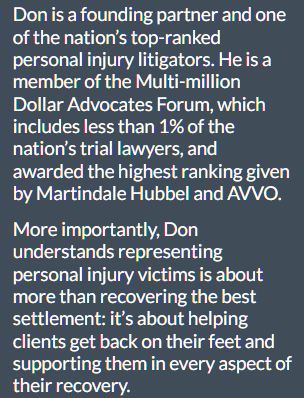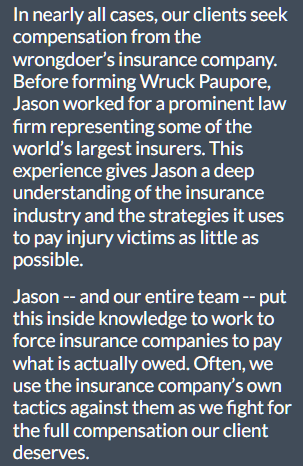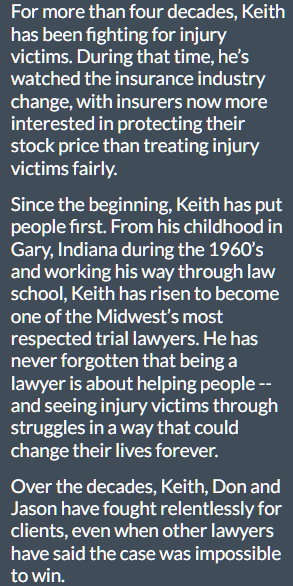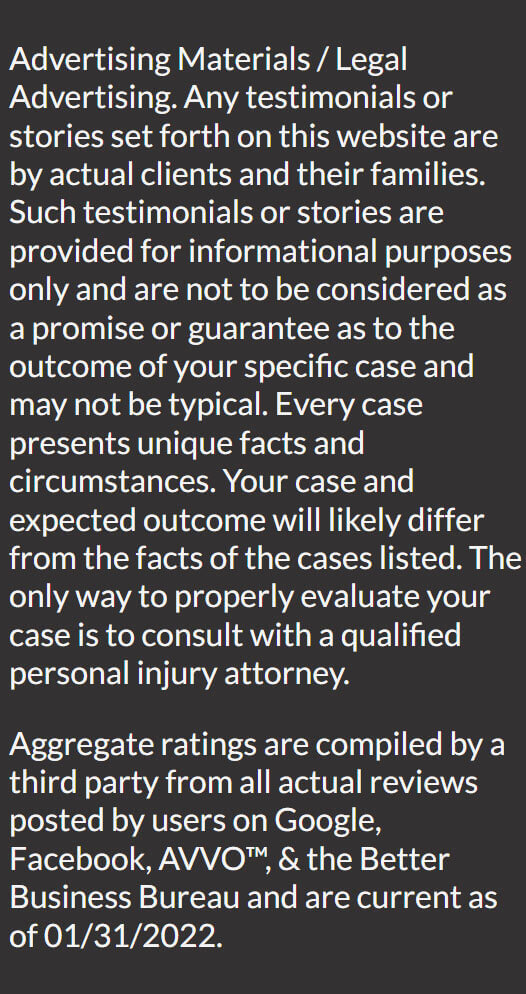



You should not have to suffer through painful injuries and expensive medical bills all because someone else was negligent. If you were injured in an accident caused by another, our legal team can assist you in exploring legal options for fair compensation. For many, personal injury lawsuits help them get the compensation they need to get back on their feet and back to their normal lives.
Personal injury claims represent a very diverse legal landscape, and all sorts of accidents and injuries might fall under this legal umbrella. The key factor in a personal injury claim is bodily harm. We need evidence of this harm and how the defendant is responsible. This might include physical evidence, photos from the accident scene, and testimony from witnesses and you. It is important to get started quickly, as evidence might disappear if we do not get to it in time, and a lot of compensation might be on the line.
For a confidential initial claim evaluation, call (219) 322-1166 and talk to our Indianapolis personal injury attorneys at Wruck Paupore.
What exactly is a personal injury claim? You might have heard the phrase tossed around on TV, in movies, or even by people you know, but what does such a claim entail? People sometimes think any personal loss is a personal injury, but this definition is too broad. You must have a bodily injury to have a personal injury claim.
This might seem like a very simple distinction, but it confuses many plaintiffs. A personal injury claim must involve some kind of physical injury to your body. The injury does not have to be severe or life-altering to give rise to a valid claim. If only property was damaged or you simply lost money without suffering physical harm, you likely have a different kind of claim.
A few examples of personal injury cases handled by our team include car crashes and collisions on the road. These are perhaps some of the most common personal injury claims, although injuries and damage may vary. Another example of a personal injury case is medical malpractice. This involves negligence from a doctor or other medical professional, usually in a hospital setting. Sometimes, personal injuries happen to someone you love. In a wrongful death case, you may sue for the grievous loss of a family member because of someone else’s negligence, and you may include damages for the personal injuries suffered by your loved one before they passed.
No personal injury case can succeed without sufficient evidence. How and where you find evidence depends on the nature of your accident and injuries. In some cases, evidence disappears quickly if it is not collected soon. As such, you should talk to our personal injury lawyers soon about what kind of evidence you need.
Much evidence and information may come from the scene of your accident. Since accident scenes are often cleaned up rather quickly, you should try to record information while waiting for help to arrive. For example, you can take pictures of the accident, your injuries, and the surrounding area. Doing so might allow you to record important details that we can use to support your claims.
If you cannot take photos, there might be other ways to get footage of the accident. Nearby security cameras might have caught the accident. If they did, we can speak to the people who own those cameras about obtaining the footage.
Physical objects may be especially important in cases where some weapon or dangerous instrument causes injuries. For example, a personal injury claim might involve a faulty power tool malfunctioning and injuring the person using it. It is also possible that an attacker hurt you with a weapon. We would need those objects as evidence of the accident and to prove how you were injured. Larger objects like vehicles may be photographed rather than hauled into court.
Some of the strongest evidence available in many personal injury cases is testimony. The people directly involved in the accident or others who have some personal knowledge relevant to your claims may testify in court. This could include eyewitnesses who were present during the accident or other witnesses who were not present but still have useful information. Your own testimony might also be extremely valuable, especially if you have a clear memory of the accident and aftermath.
Financial compensation is based on the value of your damages. Your damages reflect the injuries, losses, and experiences that resulted directly from your accident. The more damages you incur, the more compensation you might be entitled to. It is easy to lose track of certain damages or undervalue them, and you should speak to your lawyer to get an accurate idea of what your case is worth.
Compensatory damages may include economic and non-economic damages and injuries. Economic damages frequently include hospital bills, the value of damaged property, and income you lose from being unable to work because of your injuries. Non-economic damages may include less concrete injuries that might not cost you money. These include emotional distress, physical pain, and the loss of enjoyment from your life or diminished quality of life.
There are no specific statutory caps on damages in Indiana, but they are not unlimited. Your damages award should be proportional to the case. If the judge believes a jury has awarded an overly excessive award, they may reduce it to be more fair.
Punitive damages may be awarded only under very special conditions. These damages are meant to punish defendants for extremely shocking or egregious behavior. Defendants who hurt others on purpose, act with malice, or commit acts of gross negligence might be subject to such damages. According to I.C. § 34-51-3-4, punitive damages are capped at triple the value of compensatory damages or $50,000, whichever is greater.
For a confidential initial claim evaluation, call (219) 322-1166 and talk to our Carmel, IN personal injury attorneys at Wruck Paupore.
Don is a founding partner and one of the nation’s top-ranked personal injury litigators. He is a member of the Multi-million Dollar Advocates Forum, which includes less than 1% of the nation’s trial lawyers, and awarded the highest ranking given by Martindale Hubbel and AVVO.
More importantly, Don understands representing personal injury victims is about more than recovering the best settlement: it’s about helping clients get back on their feet and supporting them in every aspect of their recovery.

In nearly all cases, our clients seek compensation from the wrongdoer’s insurance company. Before forming Wruck Paupore, Jason worked for a prominent law firm representing some of the world’s largest insurers. This experience gives Jason a deep understanding of the insurance industry and the strategies it uses to pay injury victims as little as possible.
Jason -- and our entire team -- put this inside knowledge to work to force insurance companies to pay what is actually owed. Often, we use the insurance company’s own tactics against them as we fight for the full compensation our client deserves.

For more than four decades, Keith has been fighting for injury victims. During that time, he’s watched the insurance industry change, with insurers now more interested in protecting their stock price than treating injury victims fairly.
Since the beginning, Keith has put people first. From his childhood in Gary, Indiana during the 1960’s and working his way through law school, Keith has risen to become one of the Midwest’s most respected trial lawyers. He has never forgotten that being a lawyer is about helping people -- and seeing injury victims through struggles in a way that could change their lives forever.
Over the decades, Keith, Don and Jason have fought relentlessly for clients, even when other lawyers have said the case was impossible to win.


© 2025
Terms of Service | Privacy Policy | Resources | Blog | Sitemap

© 2022 Wruck Paupore PC
Terms of Service | Privacy Policy